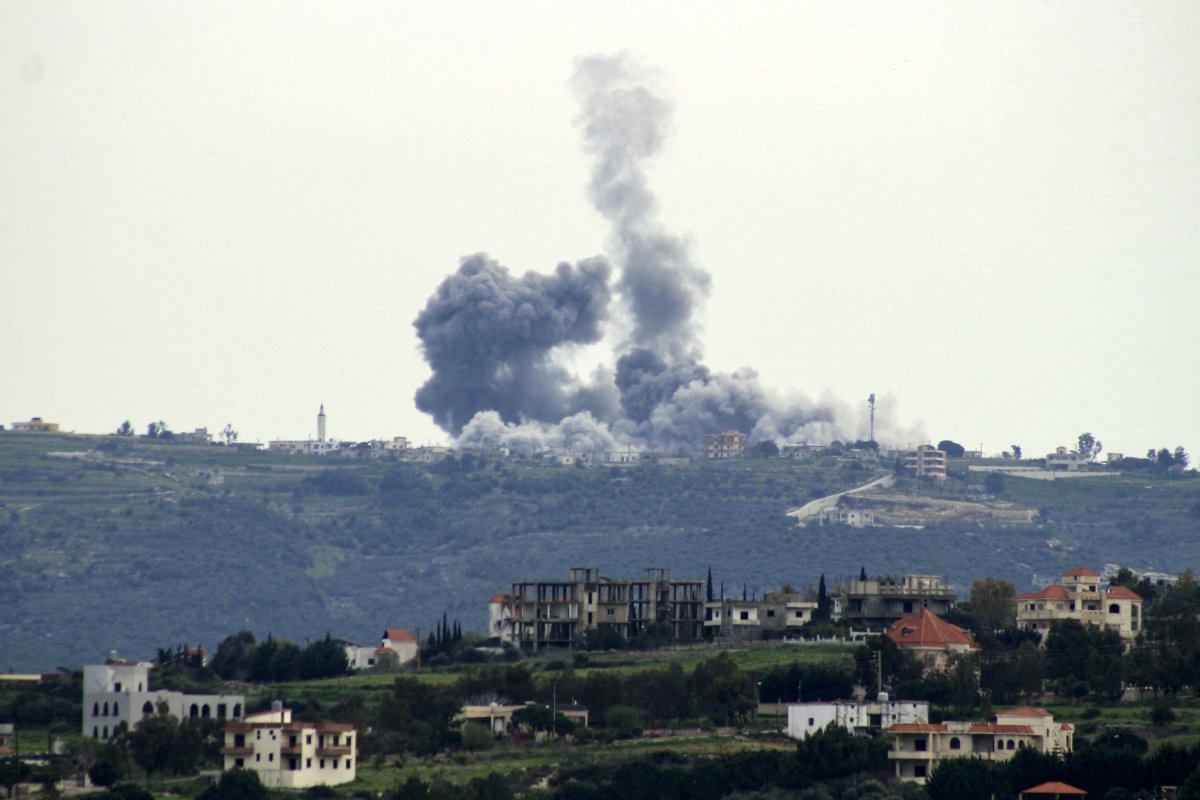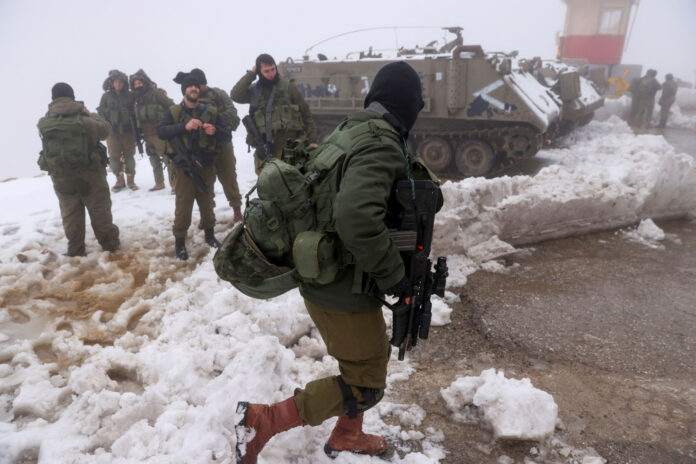The Israeli military has established a new mountaineer unit tasked with carrying out operations across the country’s hostile borders with Lebanon and Syria amid worsening tensions over the ongoing war in the Gaza Strip.
In an announcement issued Tuesday, the Israel Defense Forces (IDF) unveiled the newly formed Heharim, or “Mountain,” Brigade “as part of the operational response to the situation on the northern border and in accordance with the situational assessment.”
Led by Colonel Liron Appleman, the brigade is set to begin operations within the coming weeks under the command of the 210th Division in the disputed regions of Mount Hermon (also known as Jabal al-Sheikh) and Mount Dov (also called Shebaa Farms). Both areas have long been flashpoints for violence due to competing territorial claims and are currently under the responsibility of the IDF’s 810th Hermon Brigade. Its activities are set to begin in the coming weeks and will “specialize in combat in difficult terrain and warfare in mountainous areas.”
“The establishment of the brigade will provide a high-quality operational response and enable preparation for both defensive and offensive measures in a variety of scenarios that correspond to the terrain and the enemy in the region,” Brigadier General Zion Ratzon, commanding officer of the 210th Division said in a statement, “on both fronts simultaneously—Lebanon and Syria.”
JALAA MAREY/AFP/Getty Images
Newsweek has reached out to Hezbollah’s media office and the Syrian Mission to the United Nations for comment.
Israel’s borders with Lebanon and Syria have been the site of past wars, some directly tied to the Palestinian issue. Today, Israel remains in an official state of war with both neighbors, and hostilities have now reached their highest point in years as a result of the conflict in Gaza.
While Gaza has been the focus of Israeli operations since the Palestinian Hamas movement and allied factions carried out a devastating surprise attack on October 7, 2023, sparking the deadliest flare-up in Israeli-Palestinian violence to date, concerns have mounted over a possible full-scale eruption of fighting on other fronts.
“We are in a multi-front war—Lebanon, Syria, Judea and Samaria, and Gaza, and also farther away,” IDF Chief of the General Staff Lieutenant General Herzi Halevi said during a visit to the Israel-occupied Benyamin region of the West Bank on Friday.
News of the new Israeli brigade came amid continuing battles between the IDF and the Lebanese Hezbollah movement, which claimed new attacks Tuesday against Biranit, Tel al-Tayhat, Malkia and Birkat Risha in northern Israel as part of daily operations “in support of our steadfast Palestinian people in the Gaza Strip and in support of their valiant and honorable resistance.”
The IDF, for its part, claimed airstrikes against Hezbollah positions in Marwahin and Al-Adisa in southern Lebanon on Tuesday.
On the Syrian front, reported airstrikes targeting the capital Damascus on Monday were attributed by local officials to the IDF. Israel acknowledged two earlier strikes last week against alleged Hezbollah positions in Syria, warning that “the IDF holds the Syrian regime accountable for all activities which take place within its territory and will not allow for any attempted actions which could lead to the entrenchment of Hezbollah on the Syrian front.”
Israel has waged a years-long campaign of semi-covert strikes against suspected Iran-linked targets in Syria, sometimes referred to as “the war between wars.” Iran and a number of its allied “Axis of Resistance” militias, including Hezbollah, have supported Syrian President Bashar al-Assad throughout his country’s 13-year civil war against rebel and jihadi groups, some of which received backing from the U.S. and regional allies and partners, reportedly including Israel.
During a meeting with his Syrian counterpart in Tehran on Saturday, Iranian Defense Minister Brigadier General Mohammad Reza Ashtiani announced that the Islamic Republic was working on plans to boost Syria’s capability to defend its airspace from repeated Israeli incursions.
Meanwhile, Assad’s other top backer, Russia, has also begun to shore up its presence on the ground. In a report issued last week by the Russian Defense Ministry’s Center for the Reconciliation of the Opposing Parties in Syria, Rear Admiral Vadim Kulit said additional checkpoints manned by military police were being set up to boost disengagement efforts in the Golan Heights, internationally recognized as part of Syria but partially occupied by Israel since the Arab-Israeli Six-Day War of 1967.

AFP/Getty Images
Hundreds of miles away, other “Axis of Resistance” factions have also stepped up their efforts to increase military pressure on Israel.
A coalition of militias known as the Islamic Resistance in Iraq, which has led a months-long campaign of strikes against U.S. troops in Iraq and Syria, claimed on Monday to have targeted an IDF base in the Israeli-occupied part of the Golan Heights with drones.
The umbrella of groups said the attack “confirmed the continuation and doubling of our operations during the holy month of Ramadan in destroying enemy strongholds in completion of the second phase of operations to resist the occupation, and to support our people in Gaza, and in response to the Zionist massacres against defenseless Palestinian civilians.”
And on Tuesday, the Yemeni Ansar Allah movement, also known as the Houthis, pressed on with its campaign of targeting both Israel and commercial vessels deemed to be supportive of Israel, firing missiles at Israel’s southern Eilat region and the Marshall Islands-flagged Mado tanker in the Red Sea.
“The Yemeni Armed Forces, with the help of God Almighty, continue to perform their religious, moral and humanitarian duty towards the oppressed Palestinian people,” Ansar Allah military spokesperson Yahya Saree said in a statement Tuesday, “and their military operations will not stop until the aggression is stopped and the siege on the Palestinian people in the Gaza Strip is lifted.”
Hezbollah, the Islamic Resistance in Iraq and Ansar Allah have all demanded that Israel halt its campaign in Gaza, while Israeli Prime Minister Benjamin Netanyahu has vowed to push forward until Hamas is defeated and more than 100 hostages held in the Palestinian territory are returned.
With U.S.-backed ceasefire talks mediated by Egypt and Qatar failing to reach a resolution, however, pressure has mounted on Israel over growing civilian casualties and an increasingly dire humanitarian crisis in Gaza.
In a call Monday, President Joe Biden urged Netanyahu “to significantly increase the flow of lifesaving aid reaching those in need throughout Gaza, with special emphasis on the north,” and “reiterated his deep concerns about the prospect of Israel conducting a major ground operation in Rafah, where more than one million displaced civilians are currently seeking shelter after fleeing fighting in the north.”
Also worrying the Biden administration is the prospect of a larger war erupting across the region as U.S. forces become more deeply mired in direct confrontation on the Iraqi, Syrian and Yemeni fronts.
Speaking to reporters on Friday, Secretary of State Antony Blinken reiterated the U.S. position on the worsening humanitarian situation in Gaza and said the U.S. was working “every single day” with Israeli counterparts to address both this issue and “to look at everything that needs to be done to prevent the conflict from spreading, including to the north with Hezbollah, Lebanon, or more broadly in the region.”
Uncommon Knowledge
Newsweek is committed to challenging conventional wisdom and finding connections in the search for common ground.
Newsweek is committed to challenging conventional wisdom and finding connections in the search for common ground.


